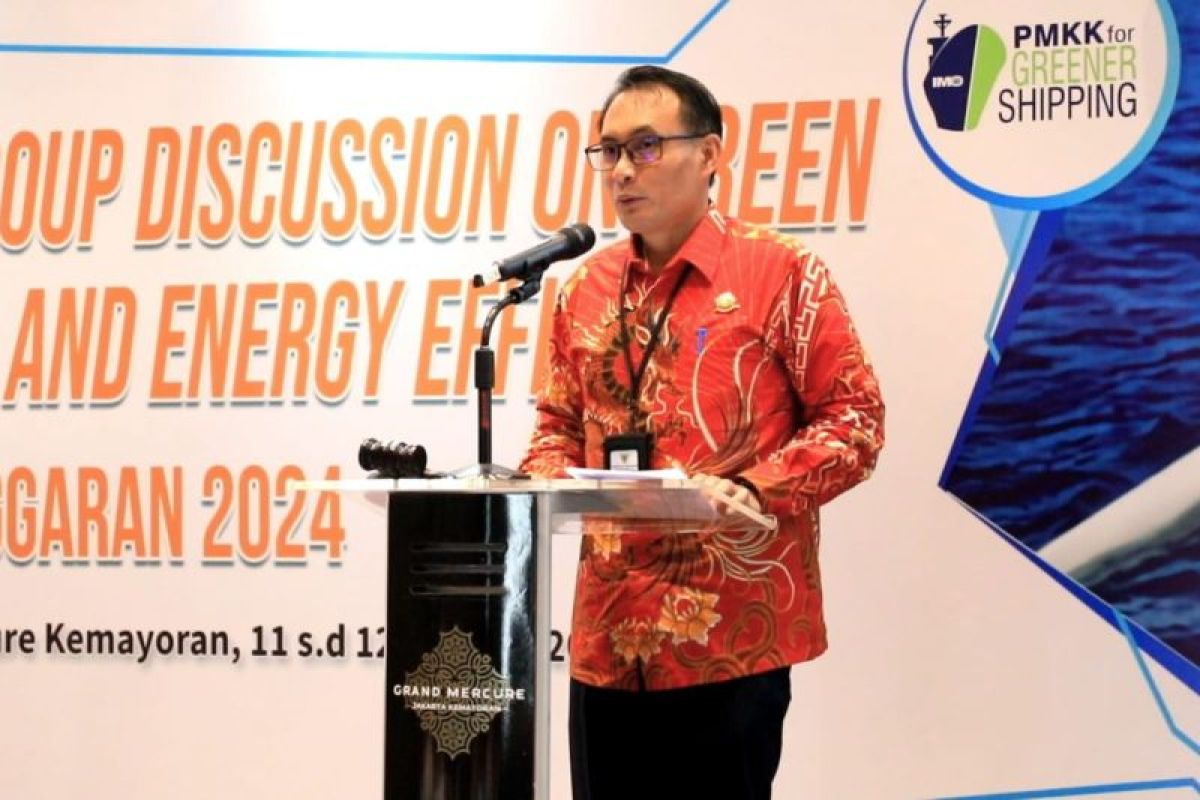The Transportation Ministry supports the implementation of green shipping to protect the maritime environment by issuing several mitigation regulations.
"These include the obligation to use low-sulphur fuel, use scrubbers for ships to clean exhaust gas, ships' rejuvenation, the use of environmentally-friendly navigation aids, and the obligation to report ship fuel consumption for all Indonesian-flagged ships," the ministry's Director General of Sea Transportation, Antoni Arif Priadi, noted in a statement received on Friday.
Priadi made this statement at the Focus Group Discussion (FGD) on Green Shipping and Energy Efficiency in Jakarta on Thursday (January 11).
In addressing environmental problems, Priadi remarked that the International Maritime Organization (IMO) has targeted to reduce carbon emissions from ships by at least 40 percent by 2030 and reduce half of the total greenhouse gas emissions by 2050.
He noted that Indonesia, as an IMO member, which is located in strategic international shipping lanes, has a major responsibility to realize a greener and more sustainable shipping and marine environment.
According to Priadi, green shipping is the process of reducing energy use to produce lower emissions. It aims to reduce marine environmental pollution from high consumption of fossil fuels in the maritime transportation sector and encourage the use of environmentally friendly energy.
"The international shipping sector contributes around two to three percent of global carbon or greenhouse gas emissions. Therefore, all maritime industry players need to play an active role in carrying out decarbonization in the shipping sector," he emphasized.
Priadi noted that the Indonesian government is also building environment-friendly maritime infrastructure to support green shipping while still paying attention to the principles of the Paris Agreement in reducing greenhouse gas emissions and supporting the realization of sustainable development.
He cited as an example that Indonesia and Denmark had demonstrated their commitment to addressing the issue of climate change and were involved in drafting bilateral and regional agreements to protect the marine environment from offshore exploration and exploitation activities in 2016.
"Since 2021, the two countries have also started cooperation and continue to carry out decarbonization efforts in the shipping sector," he added.
He noted that the ministry also continues to increase awareness and collaboration between stakeholders in creating innovations for implementing green shipping.
"With good synergy between stakeholders, we hope we can create a sustainable shipping industry to protect the maritime environment for our future generations," he stated.
Several government officials and experts, including representatives from the Ministry of Energy and Mineral Resources; the state-owned oil company, PT Pertamina; Indonesian National Shipowners Association (INSA); and state-owned port operator PT Pelindo, also attended the FGD.
COPYRIGHT © ANTARA News Bangka Belitung 2024
"These include the obligation to use low-sulphur fuel, use scrubbers for ships to clean exhaust gas, ships' rejuvenation, the use of environmentally-friendly navigation aids, and the obligation to report ship fuel consumption for all Indonesian-flagged ships," the ministry's Director General of Sea Transportation, Antoni Arif Priadi, noted in a statement received on Friday.
Priadi made this statement at the Focus Group Discussion (FGD) on Green Shipping and Energy Efficiency in Jakarta on Thursday (January 11).
In addressing environmental problems, Priadi remarked that the International Maritime Organization (IMO) has targeted to reduce carbon emissions from ships by at least 40 percent by 2030 and reduce half of the total greenhouse gas emissions by 2050.
He noted that Indonesia, as an IMO member, which is located in strategic international shipping lanes, has a major responsibility to realize a greener and more sustainable shipping and marine environment.
According to Priadi, green shipping is the process of reducing energy use to produce lower emissions. It aims to reduce marine environmental pollution from high consumption of fossil fuels in the maritime transportation sector and encourage the use of environmentally friendly energy.
"The international shipping sector contributes around two to three percent of global carbon or greenhouse gas emissions. Therefore, all maritime industry players need to play an active role in carrying out decarbonization in the shipping sector," he emphasized.
Priadi noted that the Indonesian government is also building environment-friendly maritime infrastructure to support green shipping while still paying attention to the principles of the Paris Agreement in reducing greenhouse gas emissions and supporting the realization of sustainable development.
He cited as an example that Indonesia and Denmark had demonstrated their commitment to addressing the issue of climate change and were involved in drafting bilateral and regional agreements to protect the marine environment from offshore exploration and exploitation activities in 2016.
"Since 2021, the two countries have also started cooperation and continue to carry out decarbonization efforts in the shipping sector," he added.
He noted that the ministry also continues to increase awareness and collaboration between stakeholders in creating innovations for implementing green shipping.
"With good synergy between stakeholders, we hope we can create a sustainable shipping industry to protect the maritime environment for our future generations," he stated.
Several government officials and experts, including representatives from the Ministry of Energy and Mineral Resources; the state-owned oil company, PT Pertamina; Indonesian National Shipowners Association (INSA); and state-owned port operator PT Pelindo, also attended the FGD.
Editor : Bima Agustian
COPYRIGHT © ANTARA News Bangka Belitung 2024

